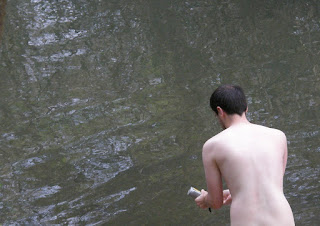Monday 21st September
Boekenhoutfontein, North West
Another day spent at Pilanesberg, this time entering by the KwaMaritane Gate and focussing on the east of the park.
 |
| Elephant, Pilanesberg |
To begin with, all was quiet and apart from a solitary rhino, things were not as exciting as last time. Soon, though, excitement came in the form of a lone male elephant crossing the road in front of us before taking a bit too much of an interest in our car and getting a little too close for comfort. It was all a bit reminiscent of the elephant kiss of last year.
A little later, we spotted four elephants heading in the direction of a dam so parked up at the side of the water and waited for their arrival, spotting several hippo as we waited. Three of the four eventually arrived, and the fourth followed but went to the other side of the water, keeping its back to the other three at all times. It was clearly in the huff about something.
As we drove on, it struck us that, unusually, we hadn't seen a single giraffe today. At least, not a live one. A huge giraffe lay dead on the plains with only its skin and bone remaining, all of the meat on its carcass gone. Vast herds of zebra and wildebeest stood looking at it in solemn assembly, seemingly unaware that the same fate may soon await them.
We stopped for lunch at Pilanesberg Centre, where they had cleverly left a salt lick in view of the terrace to attract wildlife, which duly arrived in a steady stream - first wildebeest, then a giraffe followed by four zebra and then a herd of impala.
 |
| Giraffe, Pilanesberg |
The giraffe made up for the lack of its companions that morning by posing, strutting and putting on quite a show for those watching. Giraffes are like that - they seem entranced watching people and love nothing more than to be noticed. (See Rhinos, Rhythm and the Referendum)
And giraffes were all we spotted for the next hour or so, herds of them bending over to get a good look through our windscreen.
Soon, though, all was quiet again - little to see and little sign of things improving. We spotted a couple of hippo beside a watering hole, so went to the nearby hide for a look. As we approached the hide, a man started gesturing for us to look to the left, and suddenly things got a lot more interesting.
 |
| Lion, Pilanesberg |
There, lying on the opposite side of the water were three female lions. They soon got up, revealing the male, and remained in view for only a few seconds before moving off, but watching them was still magnificent. A little further along the road, we were just able to see the four of them through the bushes again. Our first daylight sighting of a big cat and, though brief, it did not disappoint.
No sooner had we passed the lions and we were surrounded by elephants, zebra and giraffes - including lots of young.
As the light started to fade we headed for Bakubung Gate and then home, delighted with today's encounters, but at around 2km from the gate, we got stuck in a traffic jam... of elephants.
We sat in a trail of cars, all trying to get out before the gate closed, surrounded by elephants on both sides - at least sixty or so to count, including some very tiny babies. The adults were becoming agitated, and we soon worked out that this large herd had been crossing from one side of the road to the other until the line of cars had split the herd, separating mothers from their babies in the process. They began getting very angry. Trouble was that the cars had nowhere to go - they were being held hostage by an elephant obstinately standing in the middle of the road at the head of the queue.
Eventually, it began to move, and the queue started to creep forward, only to startle the elephants who began to charge. One angry female lurched at our car, just as we pulled forward so that she missed the back end by only 2 feet.
Finally, the elephant in front moved and the cars were able to make enough gaps for the herd to be reunited and we made it out of the gate with just moments to spare before closing time.









